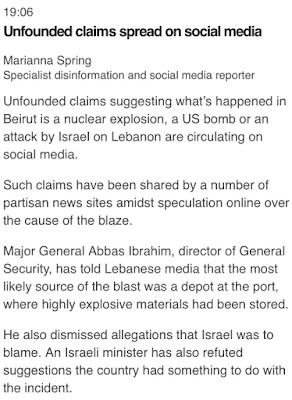Discussing the BBC’s left-wing bias is mainstream now. It’s a given. I can’t be bothered to reenact the dead parrot sketch, but I’m starting to feel that this blog might cease to be. Its time is up. It needs to be an ex-blog. There’s no future in bringing up examples of bias that a hundred Twits have already Tweeted.
However, here is one example of the BBC’s abject double standards.
If you didn’t already know this, the new arrangement is that Israel will hold off its proposal to bring the parts of East Jerusalem where Jews already live under Israeli law in exchange for normal (cordial) diplomatic relations between Israel and the UAE.
“Oh”, said Frank Gardiner. “Israel can still annex the West Bank if it wants to!” He’s not happy. “Annexation is still on the table! What’s so good about that?”
Compare that for one moment if you would, with the BBC’s undiluted enthusiasm for Obama’s Iran deal.
In case you’ve forgotten, that was an arrangement whereby Iran would hold off from developing its nuclear arsenal, (the one with which it intends to obliterate Israel) for ten years, the bribe being in exchange for the reinstatement of monies formerly withheld by way of (fully justified) sanctions.
“Oh!” said the BBC, “what a good plan! That’s ten whole years of not obliterating Israel, and the good part is that obliterating Israel with the nuclear arsenal that we’ve paid for is still on the table! What’s not to like?”
Is bribing one's enemy to ‘hold off” a good thing, or a bad thing? Depends on who’s doing the holding-off and whether the instigator is Obama or Trump.
Another worrying aspect of the BBC’s coverage of Lebanon concerns Hezbollah. The BBC’s reporting of the explosion (and of the political turmoil) in Lebanon hardly mentioned Hezbollah. After all, Hezbollah has infiltrated Lebanese politics to an alarming degree; the explosion occurred in the Hezbollah-controlled docks. Has the BBC ever reported anything about the 150,000 Iran/Hezbollah rockets pointing towards Israel?
One must conclude that the BBC’s overtly pro-Palestinian advocacy makes it sympathetic to the Iranian Ayatollahs and hostile to the Gulf States, the US and of course Israel. The BBC’s obviously negative attitude towards ‘normalisation’ between Israel and the UAE simply amounts to the BBC opposing peace.

